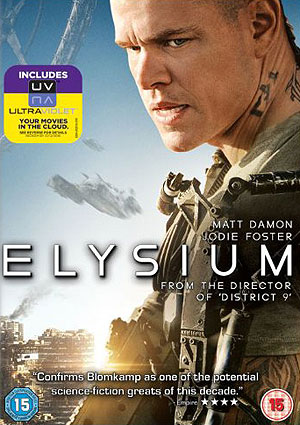
Elysium

ELYSIUM (MOVIE)
Sony Pictures Home Entertainment
Release date: December 26th, 2013
Running time: 109 minutes
Writer and director: Neill Blomkamp
Composer: Ryan Amon
Cast: Matt Damon, Jodie Foster, William Fichtner, Sharlto Copley, Alice Braga

It took all of history until the year 1804 for Earth’s human population to reach its first billion. In almost 210 years that’ve passed, we’ve been populating the planet at what I calculate to be roughly the speed of light each year; that’s around 300,000,000 births every year. Together with that is the rapid rate of deforestation, the mass extinction of life-forms that once flourished alongside us, the depletion of many of our natural resources and the rise in the numbers of wars, diseases and man-made disasters, there’s one question I can’t help but ask – how much longer do we expect this to go on?
At the same time, it’s not us who are entirely to blame for the state of the planet. The elite, that 1% of the 7 billion, the 70000000 people who are the ruling class, are more to blame for it with their planning, manipulation and enforcing of policies that continue concentration of wealth and power. It’s their greed that has drained Earth from being the paradise it could be for all so they could have more of it for themselves, while we work as slaves to support a system that many of us remain unaware of throughout our entire lives. At times I’ve even asked myself, are the elite even still here?
Much to my surprise, Elysium is a film that shares that idea in a story that might have more truth in it than it does fiction. Set in the year 2154, it takes us to a version of Earth in the future that’s been ravaged by overpopulation, war and disease. To escape the planet they’ve forced this Hell on, the elite now live on board a luxurious space station called Elysium, in full view of Earth’s population and within its orbit. Where those left behind are catalogued and tracked with barcodes burnt onto their skin, we meet Max Da Costa (Matt Damon), a former car thief and parolee who lives in the ruins of Los Angeles and works on the assembly line in one of the robotics factories of Armadyne Corp., the company that provides most of Elysium’s weapons. In this way, those on board Elysium continue to exploit the proletariat in order to maintain their bourgeois lifestyle.

Having grown up as an orphan, Max looks to Elysium as his dream of one day finding a place a he can really call home, but when an accident at work, partly caused by his egotistical boss, leads to him receiving a heavy dose of radiation poisoning, he knows he’ll do anything to get a ticket to his dream home. On board Elysium all homes are equipped with medical bays that can regenerate tissue instantly, thereby healing anyone from virtually any sickness or injury. This is in stark contrast to the near complete lack of medical care that’s provided on Earth for the everyday person.
With only a few days to live, Max tries his luck with the black market and takes on a mission to steal data from Armadyne’s billionaire CEO John Carlyle (William Fichtner) and upload it to his own brain. Unbeknownst to him, Carlyle’s brain also contains a program that can override Elysium’s central computer and make Secretary of Defense Jessica Delacourt (Jodie Foster), stripping current President Patel (Faran Tahir) of all power.
As a result of Max now having this information stored in his head, he becomes a person of extreme interest to Delacourt, but also weaved into the plot is the story of Max’s childhood  friend, Frey (Alice Braga), who works as a nurse in the rundown County Hospital. Frey’s daughter Matilda is dying of leukemia but Max’s selfish quest revolves around his own need for a cure and this form’s the backbone of his journey into becoming a reluctant hero.
friend, Frey (Alice Braga), who works as a nurse in the rundown County Hospital. Frey’s daughter Matilda is dying of leukemia but Max’s selfish quest revolves around his own need for a cure and this form’s the backbone of his journey into becoming a reluctant hero.
While Elysium entertains and inspires with its impressive dystopian visuals and well-paced story, it’s also a film that deals quite heavily with the reasons why a place like Elysium would never work. Jodie Foster plays the ruthless Delacourt perfectly, she’s a character that comes across as the epitome of bourgeois and has some of the film’s most interesting dialogue, meanwhile William Fichtner as the cold germaphobe CEO Carlyle deliciously gets a taste of his own medicine when Max brings down his shuttle during its ascent to Elysium. It’s also interesting the way language is used to draw contrasts between both sides; the elite speak French on Elysium while in Los Angeles, and we can assume many other places, Spanish has become the language of the poor, though both sides remain fluent in English.
The look of Elysium itself, inspired by Syd Mead’s famous space station design, is something that really took my breath away. Having been familiar with this image long before seeing the film,  it was amazing to see it in motion. It looked so real that I couldn’t help but wonder if the ruling class are really looking down on us worker from similar stations far above Earth. Then I realized; why would they want to see us at all from up there? As long as we toil blindly to our deaths, what do they care?
it was amazing to see it in motion. It looked so real that I couldn’t help but wonder if the ruling class are really looking down on us worker from similar stations far above Earth. Then I realized; why would they want to see us at all from up there? As long as we toil blindly to our deaths, what do they care?
Experts estimate that the human population will push past 9 billion by the year 2050, and while we may still have enough land to house them all, enough food to feed them with and enough clothes to clothe them in, others might not see it that way. With such a view in mind, Elysium makes for an interesting way with which to view how things are right now, as well as an idea what it might cost us to try to do anything about our current situation.


Patrick Samuel
The founder of Static Mass Emporium and one of its Editors in Chief is an emerging artist with a philosophy degree, working primarily with pastels and graphite pencils, but he also enjoys experimenting with water colours, acrylics, glass and oil paints.
Being on the autistic spectrum with Asperger’s Syndrome, he is stimulated by bold, contrasting colours, intricate details, multiple textures, and varying shades of light and dark. Patrick's work extends to sound and video, and when not drawing or painting, he can be found working on projects he shares online with his followers.
Patrick returned to drawing and painting after a prolonged break in December 2016 as part of his daily art therapy, and is now making the transition to being a full-time artist. As a spokesperson for autism awareness, he also gives talks and presentations on the benefits of creative therapy.
Static Mass is where he lives his passion for film and writing about it. A fan of film classics, documentaries and science fiction, Patrick prefers films with an impeccable way of storytelling that reflect on the human condition.
© 2022 STATIC MASS EMPORIUM . All Rights Reserved. Powered by METATEMPUS | creative.timeless.personal. | DISCLAIMER, TERMS & CONDITIONS
HOME | ABOUT | CONTACT | TWITTER | GOOGLE+ | FACEBOOK | TUMBLR | YOUTUBE | RSS FEED
CINEMA REVIEWS | BLU-RAY & DVD | THE EMPORIUM | DOCUMENTARIES | WORLD CINEMA | CULT MOVIES | INDIAN CINEMA | EARLY CINEMA
MOVIE CLASSICS | DECONSTRUCTING CINEMA | SOUNDTRACKS | INTERVIEWS | THE DIRECTOR’S CHAIR | JAPANESE CINEMA





